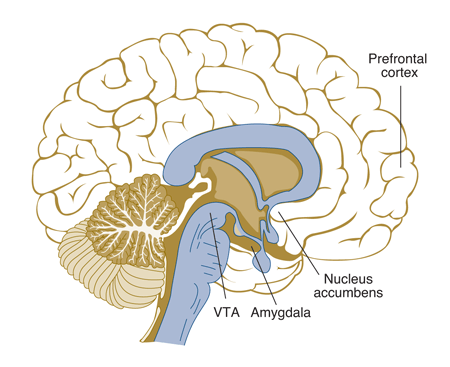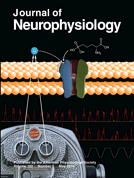1977年,美国心理学家陶诺西-田诺(Dr. Dorothy Tennov)为了定义“由于对他人的爱慕以及压倒性地想要在情感上得到回报这两者的综合而产生的一种身不由己的想法”,硬是生造了Limerence这个词。根据田诺博士的理论,Limerence有如下的组成部分:不由自主的幻想,被拒绝的恐惧,对于成功的渴望,生理上的变化(比如心悸或食欲不振),以及性欲。怎样?这些字眼是不是很熟悉?没错!这不就是暗恋么!
田诺博士的理论为研究爱情这件小事开了一个好头,但限于当时的科技水平,她无法就这些现象做出进一步的分析,也无法将爱情与大脑的功能直接联系起来。在2010年,罗格斯大学(Rutgers University)的海伦-费什(Helen E. Fisher)等人设计了一个实验。在这个实验中,他们对15名“被拒绝但依然爱着对方”的男女的脑部进行了功能性核磁共振成像(fMRI),试图找出大脑中与受挫的爱情相关的部分。研究表明,当这些受试者看着拒绝自己的另一半的照片时,大脑右侧的腹侧被盖区(ventral tegmental area或VTA)等一些区域有特异的反应,而在观看自己普通熟人的照片时,就观察不到这些位置的反应了。有意思的是,当这个研究小组选了另外17名“正在热恋”中的男女并做了同样的实验时,他们大脑中的VTA区域也同样可以看到激活反应。所以费什等人推测不管你爱得快乐不快乐,这种爱慕的心理都与VTA这个控制奖励机制的区域有关。所以即便暗恋对象追不到手,大脑里爱情的感觉却是可以真实存在的。或许这也就是为什么他/她们在心中能留有一席之地的原因吧。

VTA位置示意图
当然要完全阐述爱情的神经学机制还有很长的路要走,但所幸的是从暗藏爱意到恋爱之间的距离可以很短。从《那些年,我们一起追的女孩》到《求婚大作战》,造成男女主角从青梅竹马到天隔一方之间,其实也只是差一个真诚的表白而已。但是我并不想就如何谈恋爱这个问题继续展开讨论。既然黄舒骏在《恋爱症候群》的live中这样说过:“谈恋爱还能有理性,我想大概是假的”, 再讨论下去,恐怕有自取其辱之虞。

 Reward, Addiction, and Emotion Regulation Systems Associated With Rejection in Love
Reward, Addiction, and Emotion Regulation Systems Associated With Rejection in Love
Helen E. Fisher, Lucy L. Brown, Arthur Aron, Greg Strong, and Debra Mashek
Romantic rejection causes a profound sense of loss and negative affect. It can induce clinical depression and in extreme cases lead to suicide and/or homicide. To begin to identify the neural systems associated with this natural loss state, we used functional magnetic resonance imaging to study 10 women and 5 men who had recently been rejected by a partner but reported they were still intensely “in love.” Participants alternately viewed a photograph of their rejecting beloved and a photograph of a familiar, individual, interspersed with a distraction-attention task. Their responses while looking at their rejecter included love, despair, good, and bad memories, and wondering why this happened. Activation specific to the image of the beloved occurred in areas associated with gains and losses, craving and emotion regulation and included the ventral tegmental area (VTA) bilaterally, ventral striatum, medial and lateral orbitofrontal/prefrontal cortex, and cingulate gyrus. Compared with data from happily-in-love individuals, the regional VTA activation suggests that mesolimbic reward/survival systems are involved in romantic passion regardless of whether one is happily or unhappily in love. Forebrain activations associated with motivational relevance, gain/loss, cocaine craving, addiction, and emotion regulation suggest that higher-order systems subject to experience and learning also may mediate the rejection reaction. The results show activation of reward systems, previously identified by monetary stimuli, in a natural, endogenous, negative emotion state. Activation of areas involved in cocaine addiction may help explain the obsessive behaviors associated with rejection in love.
文献链接:https://jn.physiology.org/content/104/1/51.abstract?sid=bef91691-a2ec-420a-87a1-291f5f46b945







